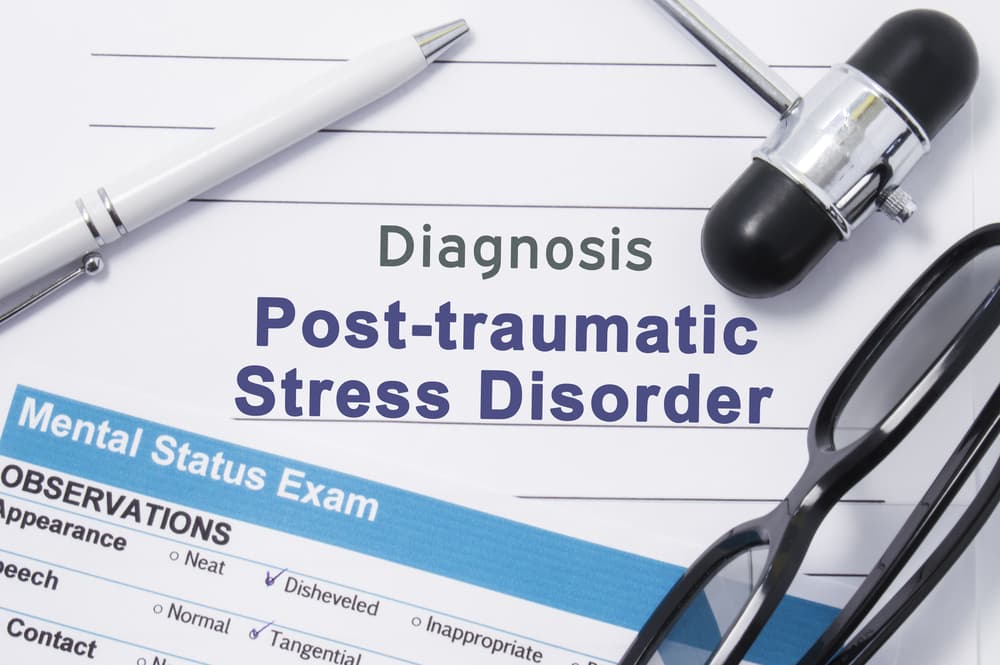In addition to suffering profoundly serious physical injuries in a car collision, accident victims may also experience intense emotional anguish and mental distress.
These often manifest themselves as post-traumatic stress disorder or PTSD. As a result of PTSD, an affected driver or passenger may experience recurring flashbacks or become afraid to operate or ride in a motor vehicle.
If you or someone you love suffered PTSD in a recent car crash, you may be entitled to monetary compensation for your medical expenses, mental health expenses, and other consequences.
A knowledgeable Savannah car accident lawyer can discuss your accident with you and develop a plan of action for recovering the monetary damages you deserve.
Types of Car Accidents That May Cause PTSD

Car accidents can be harrowing experiences, and certain types of collisions are more likely to leave individuals grappling with post-traumatic stress disorder (PTSD).
One prevalent scenario leading to PTSD is a high-speed collision, where the sheer force and impact can shatter a person’s sense of safety and security. The aftermath of such crashes often involves severe injuries and extensive damage, intensifying the emotional toll.
Another common cause of PTSD is a head-on collision, which tends to be particularly traumatic due to the sudden and violent nature of the impact. The sheer force of two vehicles colliding headfirst can result in life-altering injuries, making it challenging for survivors to overcome the resulting emotional scars.
The abruptness of a head-on collision contributes significantly to the psychological trauma experienced by those involved.
Additionally, rear-end collisions can lead to PTSD, especially when they occur at high speeds. The unexpected jolt from behind can evoke a profound sense of vulnerability, as individuals may feel helpless in preventing or mitigating the impact.
Whiplash injuries are frequent in rear-end accidents, and the associated physical pain can exacerbate psychological distress, contributing to the development of PTSD.
T-bone collisions at intersections represent another category notorious for triggering PTSD. The complexity of intersections and the potential for multiple vehicles converging simultaneously increase the likelihood of severe accidents. T-bone collisions, where one vehicle strikes the side of another, can result in catastrophic consequences, often leaving survivors with enduring emotional trauma.
Roll-over accidents, though less common, are exceptionally traumatic and frequently lead to PTSD. The chaotic and unpredictable nature of a vehicle flipping over can instill a profound fear of losing control, causing lasting psychological distress. The fear of impending danger and the sensory overload during a roll-over can imprint enduring scars on the minds of those involved.
The types of car accidents that commonly result in PTSD share a common thread of unpredictability, violence, and a sense of helplessness.
Whether it is the speed of impact, the direct force of a head-on collision, the unexpected jolt of a rear-end crash, the chaos of an intersection collision, or the disorienting roll-over, survivors may find themselves grappling with the psychological aftermath long after the physical wounds have healed.
Common Causes of Accidents That Lead to PTSD
Car accidents resulting in symptoms of post-traumatic stress disorder (PTSD) often stem from various causes that share a thread of suddenness and emotional distress. Distracted driving stands out prominently among these triggers, as it diverts attention away from the road, leading to collisions that can be mentally scarring.
Whether the distraction is smartphone use, adjusting in-car entertainment systems, or other diversions, the aftermath of such accidents can leave survivors haunted by the consequences of a momentary lapse in focus.
Speeding, a prevalent cause of severe accidents, also contributes significantly to the development of PTSD symptoms. High speeds amplify the impact force, causing more extensive damage and severe injuries.
Survivors of high-speed collisions may grapple with the psychological aftermath, haunted by the rapid, violent nature of the crash.
Driving under the influence of alcohol or drugs is another prominent factor leading to accidents with PTSD implications. The impaired judgment and slowed reflexes associated with substance use often result in devastating crashes, leaving survivors to cope with both physical injuries and the psychological trauma of knowing the accident was preventable.
Reckless driving, characterized by aggressive behaviors such as tailgating, weaving in and out of traffic, or disregarding traffic signals, contributes to accidents that induce PTSD symptoms.
A reckless driver’s sudden, unpredictable actions can shatter a sense of security on the road, leaving lasting emotional scars on those directly affected.
Weather-related accidents, particularly those occurring in adverse conditions such as heavy rain, snow, or fog, can lead to PTSD symptoms. Reduced visibility and slippery road surfaces increase the likelihood of collisions, with survivors grappling not only with the physical consequences but also the fear instilled by the unpredictability of weather-related accidents.
Finally, fatigued driving plays a role in accidents with lasting psychological impact. The diminished alertness and slower reaction times associated with driver fatigue can result in serious accidents, with survivors haunted by the knowledge that a rested driver might have avoided the collision.
The causes of car accidents that give rise to PTSD symptoms are diverse but often share the commonality of suddenness, unpredictability, and a violation of the perceived safety on the road.
How to Prove PTSD in a Car Accident Case

Proving post-traumatic stress disorder (PTSD) in a car crash case requires a comprehensive approach that considers both medical and psychological evidence.
First, obtaining a thorough psychiatric evaluation from a qualified mental health professional is crucial. The evaluator can assess the individual’s mental state, document symptoms consistent with PTSD, and establish a direct link between the car crash and the subsequent psychological distress.
Medical records play a pivotal role in supporting a PTSD claim. Emergency room reports, physician notes, and records of any mental health treatment following the accident provide a timeline of the individual’s physical and psychological well-being. These documents can establish a clear connection between the car crash and the onset of PTSD symptoms.
Eyewitness accounts and statements from passengers in the vehicle at the time of the accident can also be valuable in demonstrating the emotional impact of the crash.
These individuals may provide insight into observable changes in behavior, mood, or cognitive function in the aftermath of the incident. Their testimonies can serve as corroborative evidence to strengthen the case for PTSD.
Professional testimony from mental health professionals who are skilled in trauma-related disorders can significantly bolster the argument for PTSD. These professionals can explain to the court how the specific details of the car crash align with recognized criteria for diagnosing PTSD.
They may also provide insights into the long-term effects of such trauma, emphasizing the lasting effect on the individual’s mental well-being.
Documentation of any pre-existing mental health conditions is important. If the individual has a history of anxiety, depression, or other psychological disorders, establishing how the car crash exacerbated or triggered the development of PTSD is crucial. This helps differentiate between pre-existing conditions and trauma directly resulting from the accident.
In addition, consistent and detailed self-reports from the individual experiencing PTSD are persuasive. Journals, diaries, or written narratives describing the emotional aftermath, sleep disturbances, flashbacks, and other symptoms provide a firsthand account of the psychological toll.
Such personal accounts offer a window into the individual’s mental state and help convey the severity of their suffering.
Collaborating with skilled accident reconstructionists can provide a comprehensive understanding of the crash dynamics. This includes factors such as the speed of impact, the severity of the collision, and the individual’s proximity to the point of impact.
These details can be crucial in illustrating the traumatic nature of the event and its potential to induce PTSD.
Proving PTSD in a car crash case involves a multifaceted approach, combining psychiatric evaluations, medical records, eyewitness accounts, professional testimonies, documentation of pre-existing conditions, self-reports, and accident reconstruction analysis.
By presenting a compelling case that weaves together these elements, the legal team can establish a solid foundation for the connection between the car crash and the subsequent development of PTSD.
Ways of Resolving a Car Accident Case That Leads to PTSD

Successfully resolving a car accident case that has resulted in post-traumatic stress disorder (PTSD) involves a strategic and comprehensive approach. One effective avenue is negotiating a settlement between the parties involved.
This typically requires skilled negotiation by legal representatives, taking into account the severity of the PTSD, medical expenses, lost income, and the overall impact on the individual’s life. A well-negotiated settlement can expedite the resolution process and provide the injured party with timely compensation.
Alternatively, you may need to pursue a trial in court if the other parties refuse a fair settlement. In this scenario, you must present a compelling case. This involves thoroughly documenting medical records, psychiatric evaluations, eyewitness accounts, and professional testimonies.
A compelling narrative that illustrates the direct link between the car accident and the subsequent development of PTSD can be pivotal in securing a favorable judgment.
Mediation is another avenue for resolution whereby an impartial third party facilitates negotiations between the parties involved. This process allows for a more collaborative approach, fostering communication and potentially leading to a mutually agreeable settlement.
Mediation can be particularly beneficial when emotions are high; it allows all parties to have a voice in the resolution.
Alternative dispute resolution methods, such as arbitration, can offer a more streamlined and cost-effective approach than a full-blown court trial. An arbitrator, often agreed upon by both parties, reviews the evidence and makes a binding decision. This method can provide a faster resolution while allowing for a fair and impartial case assessment.
Engaging in pre-litigation negotiations is another strategy to explore. Before filing a formal lawsuit, legal representatives can negotiate with the other party or their insurance company. This approach aims to resolve without extensive legal proceedings, saving time and resources.
Collaborating with insurance companies is a common step in resolving car accident cases. While insurance companies typically aim to minimize payouts, effective communication and presentation of compelling evidence can lead to a fair settlement.
This involves providing comprehensive documentation, including medical records, psychiatric evaluations, and any other evidence supporting the PTSD claim.
Successfully resolving a car accident case resulting in PTSD requires a tailored approach, considering negotiation, litigation, mediation, arbitration, pre-litigation negotiations, and collaboration with insurance companies.
Each method has its advantages, and the choice depends on the case’s specifics and the parties’ willingness to reach a fair resolution.
Financial Compensation You May Recover for PTSD After a Car Crash
In a car accident claim or lawsuit involving post-traumatic stress disorder (PTSD), The individual may seek several types of compensation to address the physical, emotional, and financial toll.
Medical expenses are a primary component, encompassing the costs associated with the diagnosis, treatment, and ongoing care for PTSD. This includes therapy sessions, medications, and any other medical interventions necessary to manage the psychological impact of the accident.
Compensation for lost income is another crucial element. PTSD can significantly impair an individual’s ability to work, either temporarily or permanently. In a successful claim, the injured party may seek compensation for the income lost due to time away from work and future earning capacity if the psychological trauma has affected the individual’s ability to work.
Pain and suffering represent non-economic damages that are often a central focus in PTSD claims. The emotional distress, fear, and mental anguish resulting from the car accident and subsequent PTSD can be profound. Compensation for pain and suffering addresses the intangible, yet very real, toll on the individual’s well-being.
In cases where PTSD has led to a diminished quality of life, the accident victim may pursue additional compensation. Diminished quality of life can encompass changes in lifestyle, loss of enjoyment, and the impact on relationships and daily activities. Compensation seeks to alleviate the disruptions caused by psychological trauma and restore a sense of normalcy to the individual’s life.
The injured party may also seek reimbursement for property damage. While the primary focus in PTSD cases is on the psychological impact, a fair settlement must also include compensation for the financial burden of repairing or replacing damaged vehicles and other personal property.
In some instances, the accident victim can pursue punitive damages. The purpose of these damages is to punish the at-fault party for particularly egregious conduct, such as reckless or intentional actions that led to the car accident and subsequent PTSD. However, punitive damages depend on the circumstances surrounding the case.
In addition, legal fees and court costs incurred while pursuing the claim are often recoverable. When an accident victim retains an attorney to manage the case, the attorney’s fees are also recoverable costs.
Compensation for PTSD in a car accident claim or lawsuit spans lost earnings, loss of earning capacity, past and future medical expenses, diminished quality of life, pain and suffering, property damage, and sometimes punitive damages.
Each element addresses a specific aspect of the individual’s suffering and losses resulting from the traumatic experience, thus providing a comprehensive approach to financial recovery.
Speak With an Experienced Car Crash Lawyer in Your Area Today

If you or a person you care about suffered PTSD in a recent car accident, you may have legal options available to you. A skilled and compassionate personal injury attorney in your area can determine those options and aggressively work to pursue the settlement or litigation compensation you need in your case.
